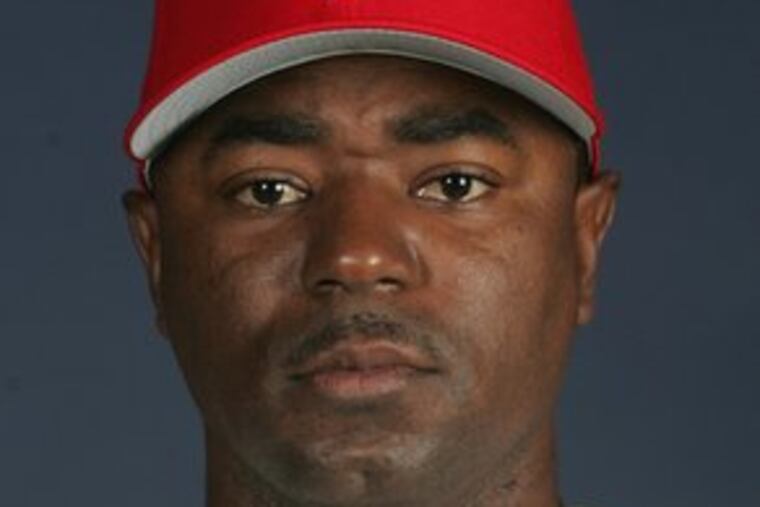Gordon, Rollins appreciative of Robinson
NOT TOO long ago, a close friend of Tom Gordon asked him who he would like to meet the day he arrives at the gates of heaven.

NOT TOO long ago, a close friend of Tom Gordon asked him who he would like to meet the day he arrives at the gates of heaven.
With little hesitation, and the obvious exclusion of some past family members, Gordon shot off his three: Dr. Martin Luther King Jr., Abraham Lincoln and Jackie Robinson.
"I think we're all dealing with a lot of issues, but Jackie dealt with a whole heck of a lot of issues and was able to succeed," the Phillies closer says. "When I look back, I just think how God put the right man in the right place at the right time. He was the catalyst and the only guy that could have done what he did."
The 60th anniversary of his significant contribution, becoming the first African-American of the modern era to play in a major league baseball game, will be recognized Sunday.
In celebration of that historic day (April 15, 1957) at Ebbets Field, baseball plans to commemorate Robinson's legacy by holding special ceremonies in each of the 15 ballparks playing host to games Sunday, concluding with a nationally televised observance at Dodgers Stadium during the Dodgers-Padres night game.
The Phillies have agreed to allow all of their players to wear Robinson's retired No. 42 that day, as will members of the visiting Houston Astros. In addition, the Phillies are planning to pay tribute to Robinson with a series of events, including a ceremony honoring the four living members - Bill Cash, Mahlon Duckett, Stanley Glenn and Harold Gould - of the Philadelphia Stars. That team played from 1934 to 1950 and won the 1934 Negro National League pennant.
Shortstop Jimmy Rollins will represent the Phillies in this Robinson tribute.
While Rollins is proud to be carrying on the tradition of Robinson, he's unsure how Robinson would respond to the declining numbers of African-Americans in the sport.
According to Richard Lapchick, director of the University of Central Florida's Institute for Diversity and Ethics in Sports, only 8.4 percent of players in the majors last season were black - the lowest amount in 2 decades.
Rollins attributes that to the lack of African-Americans being promoted positively in the game. He says that while African-Americans such as Barry Bonds seem to almost daily draw negative press, players such as Ryan Howard sometimes go overlooked.
"Has the sport done a good job of marketing it to our community?" Rollins asks. "No. I mean, why not put Ryan Howard out there more? Here's a guy who won the Home Run Derby last year. Was he on the front page of USA Today? I mean, come on."
Rollins, who appeared on ESPN's "Outside the Lines" last Sunday with Cleveland pitcher C.C. Sabathia and Tampa Bay outfielder Carl Crawford to talk about the racial imbalance in the sport, says he tries to promote baseball to the youth as much as he can. However, when you're in competition with basketball and football, two sports that black children tend to gravitate toward, it's a tougher task.
"I get asked all the time, 'Why do you play baseball?' Then I ask them, 'Well, why don't you? You're not going to be too much taller than me, so basketball might be tough and you probably won't make it in football,'" Rollins says.
"But in that sense, I'm just trying to come at them on their level and have fun with them while still seriously trying to persuade them toward the sport. But you can't just shove it down their throat."
When younger African-Americans do get to the majors, they seem to cherish it a little more, says Phillies rookie outfielder Michael Bourn. Rarely does a day go by that he doesn't stop and think about where he could have been had it not been for Robinson's impact on the game. He says he still hears the pain in his father's voice when he speaks of watching Robinson play in Louisiana and what it was like growing up in the South during the '50s and '60s. Bourn was raised in Texas.
"Honestly, I really don't think we realize everything that he had to go through on an everyday basis," he says. "Teammates wouldn't talk to him, wouldn't play catch with him . . . that's a lot to go through just to play the game that you love.
"While you love the game, there is only so much a man can take . . . He took everything, more than I think any of us could have ever taken. I don't know if I could have done it."
Rollins agrees, saying that he would likely be in awe had he ever had the chance to meet Robinson, who died in October 1972. He said he still thanks and appreciates the things Robinson endured 60 years ago so that Rollins and other African-Americans could be the players they are today. He says that he often wonders what and where baseball would be had there been no Jackie Robinson.
"Would there even be baseball without Jackie Robinson? I think that's the question," Rollins says. "Probably not. Eventually it was going to change, but it was going to take a special person to really kick the door down. He was the appointed one and he did a helluva job representing himself and the African-Americans for that cause." *